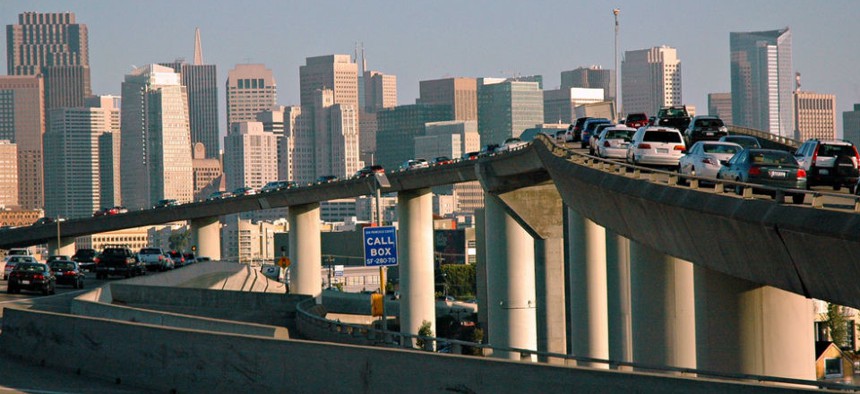
San Francisco commuter traffic. Flickr user wonderlane
Parking Perk Will Continue to Dwarf Transit Benefit Unless Congress Acts
Union expects parity will be restored by the end of this year.
The mass transit tax benefit used by thousands of federal employees will remain at 2014 levels in 2015 if Congress doesn’t pass legislation in the next few months to increase the subsidy.
The benefit for mass transit dropped from $245 in 2013 to $130 on Jan. 1, 2014 after a provision in the 2012 American Taxpayer Relief Act -- also known as the fiscal cliff deal -- expired. The parking benefit, however, actually increased by $5 to $250 between 2013 and 2014. A Senate bill that would have restored parity to the mass transit and parking benefit, retroactive to the beginning of 2014, was blocked in the spring.
The fiscal cliff deal restored parity between the mass transit and parking benefits, but only for 2013. The mass transit increase for 2013 was temporary, which is why the cap was smaller in 2014; the change for the monthly parking limit is a permanent provision in the law so the annual cost-of-living adjustment boosted the maximum benefit to $250 per month this year.
Congress returns from recess next week before leaving again in a few weeks for the mid-term elections, and they’ve got a lot to do in that short amount of time, including keeping the government open. Still, National Treasury Employees Union President Colleen Kelley said her group expects that a measure to restore parity between the mass transit and parking benefits “will be part of a tax extenders bill taken up by Congress prior to the end of this year.” Kelley added that “transit benefit parity is a matter of considerable importance to many federal employees and NTEU continues its efforts to secure it.”
The change affects all commuters, not just federal employees. Employers who offer the tax benefit, including the federal government, do not dole out the benefits equally. Just as feds use a variety of transportation modes to get to work -- including car, rail, vanpool, ferry and bus -- agencies allocate transit and parking benefits slightly differently. And perhaps most important, the value of a mass transit subsidy directly correlates to the reliability and availability of public transportation in a particular area. As for parking perks, when an agency offers them, it typically comes down to supply and demand.
And not everyone receives the maximum benefit under the law, or even a full menu of options. Federal employees are eligible to receive a tax-free transit subsidy that is equal to, but must not exceed, the amount they spend on their commute; if they don’t use the full amount in any given month, the surplus flows back to the government. And an individual cannot receive both a transit and parking subsidy.
(Image via Flickr user wonderlane)







